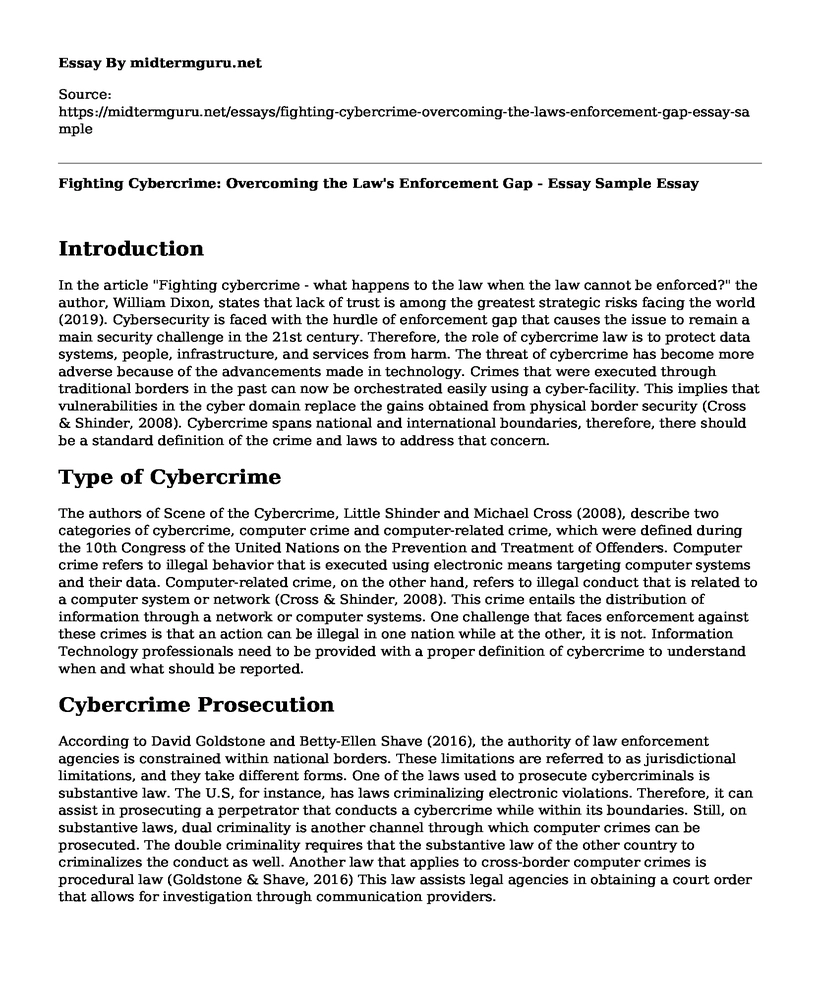Introduction
In the article "Fighting cybercrime - what happens to the law when the law cannot be enforced?" the author, William Dixon, states that lack of trust is among the greatest strategic risks facing the world (2019). Cybersecurity is faced with the hurdle of enforcement gap that causes the issue to remain a main security challenge in the 21st century. Therefore, the role of cybercrime law is to protect data systems, people, infrastructure, and services from harm. The threat of cybercrime has become more adverse because of the advancements made in technology. Crimes that were executed through traditional borders in the past can now be orchestrated easily using a cyber-facility. This implies that vulnerabilities in the cyber domain replace the gains obtained from physical border security (Cross & Shinder, 2008). Cybercrime spans national and international boundaries, therefore, there should be a standard definition of the crime and laws to address that concern.
Type of Cybercrime
The authors of Scene of the Cybercrime, Little Shinder and Michael Cross (2008), describe two categories of cybercrime, computer crime and computer-related crime, which were defined during the 10th Congress of the United Nations on the Prevention and Treatment of Offenders. Computer crime refers to illegal behavior that is executed using electronic means targeting computer systems and their data. Computer-related crime, on the other hand, refers to illegal conduct that is related to a computer system or network (Cross & Shinder, 2008). This crime entails the distribution of information through a network or computer systems. One challenge that faces enforcement against these crimes is that an action can be illegal in one nation while at the other, it is not. Information Technology professionals need to be provided with a proper definition of cybercrime to understand when and what should be reported.
Cybercrime Prosecution
According to David Goldstone and Betty-Ellen Shave (2016), the authority of law enforcement agencies is constrained within national borders. These limitations are referred to as jurisdictional limitations, and they take different forms. One of the laws used to prosecute cybercriminals is substantive law. The U.S, for instance, has laws criminalizing electronic violations. Therefore, it can assist in prosecuting a perpetrator that conducts a cybercrime while within its boundaries. Still, on substantive laws, dual criminality is another channel through which computer crimes can be prosecuted. The double criminality requires that the substantive law of the other country to criminalizes the conduct as well. Another law that applies to cross-border computer crimes is procedural law (Goldstone & Shave, 2016) This law assists legal agencies in obtaining a court order that allows for investigation through communication providers.
Law Enforcement and Policy-making
The roles of creating policies and enforcing cybersecurity laws lie within different agencies. The United Nations, as highlighted above, is involved in discussions regarding the security concerns around the world (Cross & Shinder, 2008). Therefore, the organization is a crucial play in the formulation of policies on how to deal with cyber threats. The enforcement of these laws is conducted by the respective law enforcement agencies in various countries. In the U.S., the government uses its investigative machinery to follow up on crimes and capture the offenders. The public should cooperate with enforcement agencies to help make the fight against cybercriminals effective.
Conclusion
In conclusion, cybercrime is a rising concern that needs a collaborative effort of nations to provide security. Government cooperation is critical in the process of arresting cyber offenders violating the security of foreign countries. The public, especially the corporate world needs to partner with the government in sharing information to facilitate law enforcement.
References
Cross, M., & Shinder, D. L. (2008). Scene of the cybercrime. Burlington, MA: Syngress Pub.
Dixon, W. (2019, February 19). Fighting cybercrime - what happens to the law when the law cannot be enforced? Retrieved July 17, 2019, from https://www.weforum.org/agenda/2019/02/fighting-cybercrime-what-happens-to-the-law-when-the-law-cannot-be-enforced/
Goldstone, D., & Shave, B. (2016). International Dimensions of Crimes in Cyberspace. Fordham International Law Journal,22(5). Retrieved July 17, 2019.
Cite this page
Fighting Cybercrime: Overcoming the Law's Enforcement Gap - Essay Sample. (2023, Jan 28). Retrieved from https://midtermguru.com/essays/fighting-cybercrime-overcoming-the-laws-enforcement-gap-essay-sample
If you are the original author of this essay and no longer wish to have it published on the midtermguru.com website, please click below to request its removal:
- Women That Are Denied of the Basic Human Rights in Republic of Gilead
- Exceptions of Miranda Rule - Research Paper
- Freedom of Speech: Right to Express Without Restriction - Research Paper
- Literary Analysis Essay on No Matter How Loud I Shout
- Blue Lives Matter: The Countermovement to Address Police Officer Deaths - Essay Sample
- Understanding Crime Prevention Through Self-Regulation and Conscientious Behavior - Essay Sample
- Juvenile vs Adult Courts: Comparing a Case Study - Essay Sample







